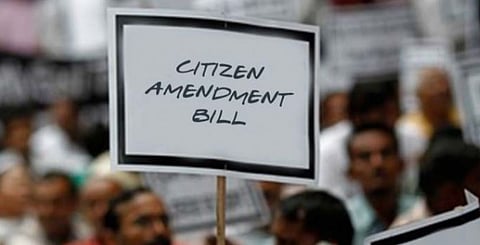
- Home
- Live Blog
- Breaking News
- Top Headlines
- Cities
- NE News
- Sentinel Media
- Sports
- Education
- Jobs

A Reporter
SHILLONG: Mantre Passah and Rev Kyrsoibor Pyrtuh, who are part of the people’s movement, Thma U Rangli-Juki (TUR) and Workers Power of Meghalaya (WPM), have filed a PIL in the Supreme Court on January 13, 2020, challenging the constitutionality of the Citizenship Amendment Act 2019 (CAA) which has been notified in the gazette by the Central Government on January 10, 2020.
Speaking to reporters on Thursday, Mantre Passah said, “Our challenge bases on the arbitrariness of CAA and its attack on the freedom of religion and privacy of individuals. We are being represented in the court by a group of lawyers whose knowledge of the constitutional jurisprudence is well respected in the legal circles.”
The group includes Gautam Bhatia, Vrinda Bhandari, Malvika Prasad and others.
“We are challenging the said Act because it attacks the fundamental rights of the individuals belonging to the tribal communities, with respect to their persecution as a trans-border tribal community as well as their status in neighbouring countries, including the Khasi-Pnar, Garo and other smaller tribal communities here in the state of Meghalaya bordering the country of Bangladesh,” he said.
He said that the said Act fails “to take into account the lived realities of the inhabitants of those border regions, many of whom follow indigenous religions and do not identify as being of a part of any of the six selected religious communities”.
Meanwhile, Rev Kyrsoibor Pyrtuh said that this is a blatant design of creating a divide among the various tribal communities, especially those who follow the indigenous traditional belief system like the Niam Tynrai and Songsarek (which are distinct belief systems and are not part of any mainstream religion like what certain elements want us to believe), followers among the Khasi-Pnars and Garos, who do not fall under any of the religions mentioned in the CAA (Hindu, Sikh, Buddhist, Jain, Parsi or Christian).
It must be understood that historical factors like the drawing up of borders during the partition of India as well as colonial British policy have played a role in affecting the relationship and connections of these tribal communities. This Act fails to take into account this fact in addition to being arbitrary and motivated by religious discrimination. That is why we as the petitioners feel that this Act is clearly motivated by insidious thinking and planning of the present ruling regime, the Hindutva ideology of which is based on the belief of Hindu majoritarianism and supremacy in the nation state of India, and which treats minorities, religious or otherwise, as secondary, Pyrtuh further stated.
The original Citizenship Act, 1955 was enacted on the same principles as the Constitution and no religion based requirements or conditions were imposed for the acquisition of citizenship. “The impugned Act violates the right to privacy of refugees belonging to indigenous tribes following traditional religions and imposes unconstitutional conditions upon them.”